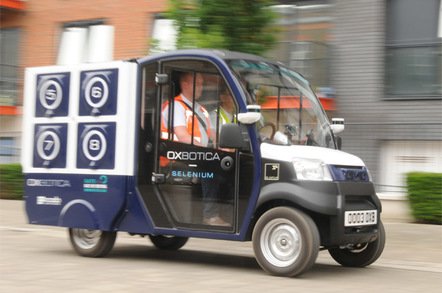London Assembly report shines light on UK.gov’s auto auto plans
While conceding that connected and autonomous vehicles (CAVs) bring “significant potential benefits for road safety and mobility”, the assembly’s Transport Committee said in a report issued this week that the rise of driverless cars could put London mayor Sadiq Khan’s plans for eliminating private car use “in jeopardy”.
Transport for London condemned driverless car technology last year on the grounds that it would reduce tax income for the rapacious transport authority. London’s public transport networks are owned by the state and outsourced to private operators, with the bulk of the revenues flowing back into TfL’s coffers.
In its Future Transport Report, the London Assembly said: “The most effective strategy for TfL is to embed sustainable transport choices ahead of CAV rollout. Shared usage of CAVs is likely to be the most sustainable way of harnessing this technology in London.”
The report also acknowledged the benefit of driverless cars for “older and disabled Londoners, who may not be able to drive”.
Forget central government’s 2021 target for auto autos
It also added that in meetings with “a range of experts” that the “widespread rollout of advanced CAVs” was “more likely to occur over the period from 2030 onwards”, citing Professor Natasha Merat of the University of Leeds. The chief exec of the Transport Research Laboratory, Rob Wallis, also told the Assembly: “The real uptake and usage and the real volume adoption of automation, though, we think, is going to probably take another 10 years or so, probably about 2030.”
Dan Phillips of the Greenwich Gateway driverless cars project also told the elected members, in an evidence session held last year: “From 2020 onwards, you will get level-3 vehicles, which are effectively vehicles that have basic autonomous features – like adaptive cruise control (ACC), lane changing, crash avoidance and self-parking.
“Between 2025 and 2030 perhaps, most vehicles will have advanced autonomous control. Some will have no steering wheel at all and others will have a steering wheel but you will not have to use it necessarily. Then, from 2030 onwards, more and more vehicles will become available without steering.”
Industry talking heads are publicly committed to Chancellor Philip Hammond’s ambition to get driverless cars on the roads by 2021, a date which falls before the next general election. The assembly also cited American research from “late 2016” about public attitudes towards driverless cars – suggesting that the results from UK studies into public attitudes towards driverless vehicles, in particular the Greenwich Gateway trial, were not available to the report’s authors.
Alison Bell, the Assembly’s comms manager, told The Register: “The London Assembly Transport Committee’s position on CAVs is that they have potential benefits and risks for Londoners that should be carefully managed by the Mayor and TfL. A useful first step would be an update to the car club strategy to encourage car sharing.”
In response to The Register‘s question about whether London’s public sector aversion to driverless cars is because it hasn’t yet figured out a way of taxing them, she said: “The investigation did not consider any potential revenue-raising opportunities from CAVs at all.”
Not droning on
The report also looked at the rise of drones, though it lumped this in with self-driving delivery robots as well as the airborne kind. It recommended that TfL and the London mayor look at ways of “proactively” shaping future drone regulation by lobbying the Civil Aviation Authority and central government, which it said should include “the necessity for new TfL powers in this area”.
“Our best estimate is that [drones] will replace some deliveries currently made by road vehicles, but probably not to the extent of having a significant impact on traffic congestion levels. Even on a small scale, however, drones would have an impact on Londoners and need to be effectively controlled,” said the report.
The full thing, a 52-page PDF, can be read on the London Assembly website. ®






